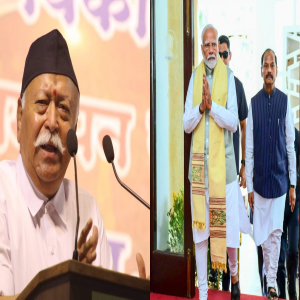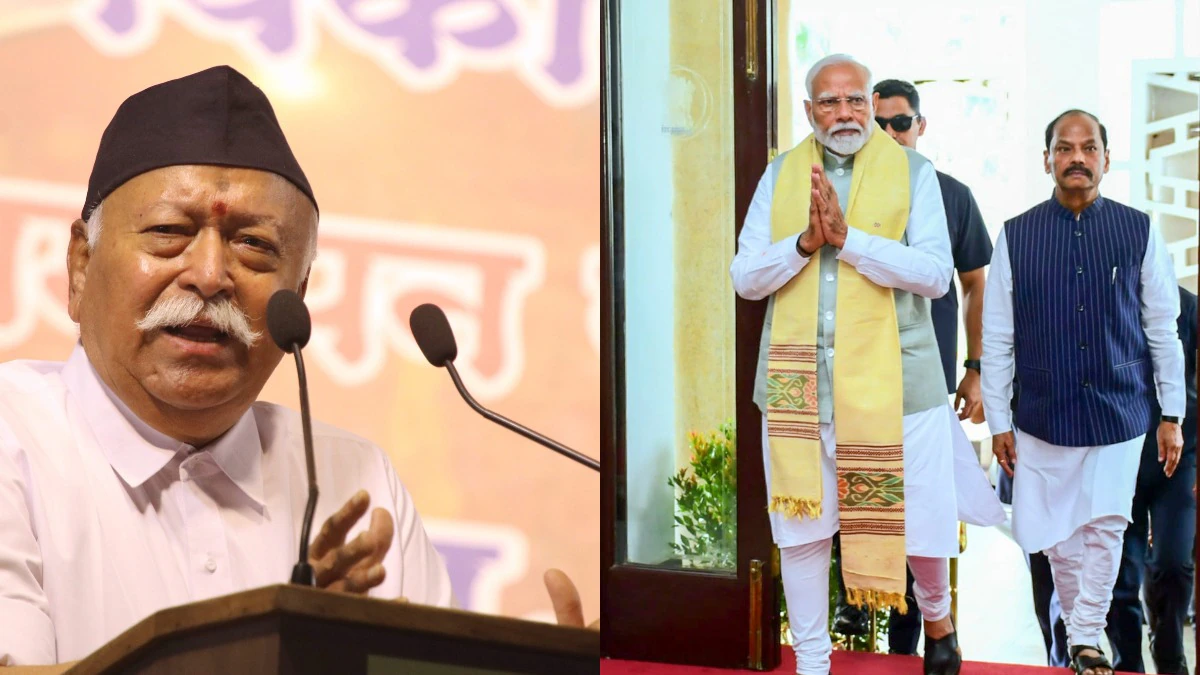
.png) Ram Puniyani
Ram Puniyani

The Parliamentary Elections of 2024 gave disappointing results for BJP. Its strength in Lok Sabha came down from 303 to 240. Therefore, the formal NDA Government had to become an actual NDA Government. The alliance partners who had no say during the last ten years are now comfortably placed at a stage where there is some possibility of their voices being heard. This may reduce the dominance of BJP's Hindu Nationalist agenda. To cap it all, the increased strength of the INDIA coalition and increasing popular support for Rahul Gandhi led to the opposition becoming more assertive and forceful.
In these elections, it seems probable that RSS had not come forward to aid its political progeny, the BJP. That does not mean RSS wanted the BJP to be defeated; it might just have been aimed at subtly reprimanding the rising 'non-biological' syndrome to deflate his rising dominance. Still, RSS is in the driving seat or more accurately, is the back seat driver. RSS leaders are already having long meetings with BJP leaders to analyse the results of elections and to chart out future strategies.
Live Hindustan reported that in UP, the RSS delegation was led by Sah-Sarkaryavah (joint general secretary) Arun Kumar, who has pioneered coordination between the two organisations. RSS's Ram Madhav has taken charge of the Jammu and Kashmir elections.
At a deeper level, the understanding of RSS is that the major reason for the BJP's decline in this election has been the shifting of the Dalit vote towards the INDIA coalition. To tackle this, VHP is being activated, which will be having a series of meetings in Dalit bastis to co-dine with them and to organise religious programs to lure them. The VHP saints and sadhus will be undertaking this. The Hindu reports, "These religious leaders will undertake padyatra [foot march] in the designated areas, organise satsangs, dharm sansads [spiritual gatherings], visit homes of people hailing from the communities, and eat at their houses. This program will be undertaken in the 9000 sub-division of VHP."
In a way, it is reminiscent of the Ram Temple movement, where the VHP played the foundational role, and then the BJP took over. RSS not only trains the drivers (Pracharaks, Swayamsevaks) but also does the backseat driving. The 2024 parliament election results have shaken it, and it plans to go full throttle to win back the shifting vote bank. The response of RSS to these election results yet again shows that its claim of being a cultural organisation is a mere façade. It is another matter that now their political strength may have to go in the reverse direction for multiple reasons. With ten years of Modi rule and the major unfolding of the Hindutva agenda, the realisation is reaching far and wide that this organisation, which stands for 'manusmirti' and 'hate' politics, cannot stand for social justice in any way.
It has taken so long for the opposition parties to see the reality of the politics of Hindu Rashtra. The ten years of dictatorial rule and the partisan agenda of Modi-BJP took such a toll on the nation that it is only now the opposition parties are taking baby steps to counter the politics of RSS. RSS, as such, had a long journey from its blunt formulations praising Nazis and fascists as articulated in its second Sarsanghchalak MS Golwalkar's "We or Our Nationhood Defined," to opposing the tricolour, to opposing the Constitution to more subtle language at present. Also, its prestige in people's eyes had nosedived after the murder of Mahatma Gandhi by Nathuram Godse.
By a quirk of fate, Jayaprakash Narayan's "Total revolution" came to give credibility to RSS. JP was a giant of a freedom fighter. Still, he could not see the true nature of RSS when he said, "If the RSS is fascist, I too am a fascist." Just prior to this, Nehru had grasped the true nature of RSS. In his letter to the heads of provincial governments in December 1947, Nehru wrote that "We have a great deal of evidence to show that RSS is an organisation which is in the nature of a private army and which is definitely proceeding on the strictest Nazi lines, even following the techniques of the organisation." This understanding of his was not taken seriously by the later governments. The RSS-trained pracharaks had started infiltrating different crucial aspects of the social and political life of the country.
The period of two terms of BJP rule has totally disillusioned a large section of people and many parties. They have realised that what Nehru was saying has more than a grain of truth in it. To cap it all, most of the civil society groups who had been aloof from the electoral processes so far have woken up. These groups do see the fact that the rule of BJP-RSS has already done so much damage to our society that irrespective of the weaknesses of the INDIA coalition, a situation has to be created where the goals of the INDIA coalition of democracy and pluralism have to be strengthened. Starting from the Karnataka initiative of Eddulu Karnataka and then Bharat Jodo Abhiyan, many civil society initiatives are aligning together, irrespective of their difference on other issues, to ensure that democracy survives and pluralism thrives.
This realisation is not just at the political level. The observation as to how scientific temper is being undermined and blind faith being promoted is there for all to see. The blind glorification of the past, the first plastic surgeon from ancient India, gold in cow urine or promoting banging of thalis (utensils) to drive away Coronavirus have shattered the core of rational thinking. IITs, the peak of our academic attainment, are taking up projects to prove the usefulness of Panchgavya (mixture of cow dung, urine, milk, ghee and curd).
The RSS-trained pracharaks are lurking in the mainstream and social media and have infiltrated the very body of our national life with misinformation that glorifies retrograde values. The rot is very deep, and the electoral defeat of the BJP is a mere first step which has to be followed by building a social common sense rooted in the values of our freedom movement. Whether it is history, science or the legal system, the rot brought in by communal ideology must be combated.